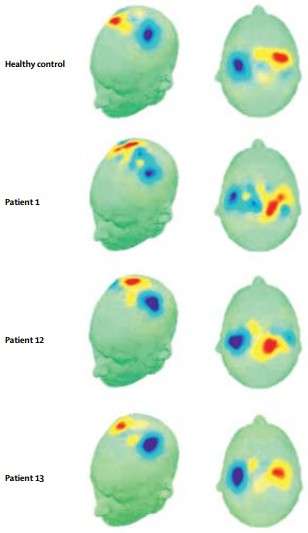Life sciences are promising, declared Rao Yi on April 21, the 2013 Open Day of Peking University (PKU).
Rao Yi at the Recruitment Consulting Conference
“Chinese young people with ideals, dreams and ambitions would be warmly welcomed to the field,” the dean of PKU School of Life Sciences sent his invitations via hundreds of parents at the PKU Stadium, whose children would attend the Chinese National College Entrance Exam this year.
A Science of Magnificence
Life sciences, in Rao’s eyes, reach the acme of the nature’s beauty — as he mentioned the 3D-structure figure of a human’s enzymatic protein, a recent achievement of Professor Su Xiaodong from the School.
Prof. Su Xiaodong’s ribbon diagram of human AK6, enzymatic protein
“It is also quite amusing,” illustrated Rao with Professor Adrian M. Owen, who had discovered the “residual cognitive function and conscious awareness” of the vegetative with electroencephalography.

EEG signals associated with motor imagery in the healthy and the vegetative
Another feature of life sciences is their widespread practical use, such as medicine. Professor Deng Hongkui, Rao introduced, had induced stem cells to cure diabetes in mice. Deng’s long-term goal is to make it curable for humans.
A School of Innovation
“Assuming that you were in the 1960s, how would you figure out the genetic code?” asked Rao, explaining his educational idea — for creative scientists, rather than average technicians.
“I think he (Rao) has wonderful blueprints for future development of life sciences, one key of which is individual development, and another is discipline interaction,” commented a student present on the Open Day.
To fulfill the students’ creativity, PKU School of Life Sciences covers almost all the related research directions, attempting to maximize every merit of the subject — from biochemistry and molecular biology, to bioinformatics and ecology — “Here must be at least one area of your interest — from the atom to the elephant,” generalized Yang Quan, academic dean of the School.
Consequently, with the research interest determined, a student would be “graduatized” in advance by entering a lab in the sophomore year. “For graduates and senior undergraduates, doing experiments independently is of the first importance,” said Tao Wenqi who works on student affairs at the School, “They could apply for their own projects in the labs and furthermore do whatever they like.”
“Tutorial system,” as another bright spot of the School’s educational reform, builds up one-to-one relationships between the teaching staff and the students. Instead of bringing more shackles, a “tutor” will create more freedom, guiding the students to establish an individual training mode with whichever courses they like.
“We also provide opportunities of international summer internships. About 20 students are sent to university labs abroad every summer,” added Yang Quan.
The “Challenge Class,” one of the School’s most ambitious measures, chooses about 15-20 undergraduates from the earlier grades each year. A 200,000-yuan scholarship will then be awarded to the most potential and talented biologists among them.
Such a kind of elite education, as well as more interdisciplinary attempts, finally nurtured PKU iGEM. With the titles of “Grand Prize” and “Best Information Processing Project” in 2007, the team went further till publishing their paper on Molecular System Biology.
When asked about “teaching innovations,” Yang Quan answered, “Despite the absence of an official recognition, I think our School must be the one that invests most on students’ innovations. We sincerely hope to nourish their talents of creativity.”
The investments of all sorts have already paid off. According to QS World University Rankings 2013, PKU ranks 45 in life sciences around the globe.
A Dream of Transformation
“It is the interest that determines the career,” Yang Jiahe, a volunteer at the School’s inquiry counter, responded to the parents’ concerns on their children’s employment.
The teachers and volunteers talk with the parents.
Employment seems not an urgent choice, since 97% of the undergraduates could get the exam-exempted qualification of graduate admission, which only 25% would actually take it. In fact, more than half would go to Harvard, Stanford, Princeton, Yale, MIT, and other world-renowned institutions with full scholarships for doctorates.
The students can get more preparation for jobs in their graduate study. “Biological pharmaceutics, which takes 80% of the market, is the mainstream industry around life sciences,” added Tang Ping, a stuff member, “in ten years — after your children’s graduation, the domestic industry will balloon.”
Besides, those who drop academic research are still competent in the labor market. “Some will start their own businesses; some will go to investment banks — nothing ever to do with biology,” said Yang Jiahe, “The major does not count that much, but the ability of your own does.”
Dean Rao, never worried about the employment rate of his student, is against the pragmatic view that the salary overrides anything else, “We hope to motivate the young with ambitions, who are resolved for the development of people’s knowledge and life.”
“We wish to provide a suitable environment with better conditions to support every student, making PKU a start for their success in the future,” said Rao.
Reported by: Yan Shengnan
Edited by: Arthars